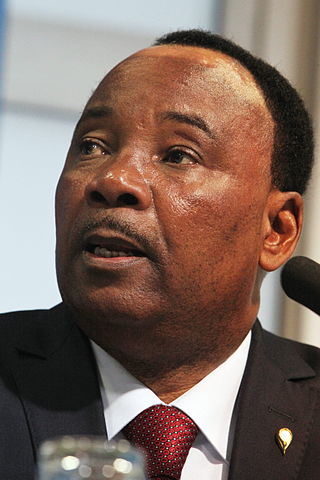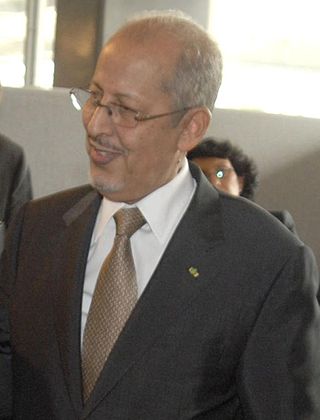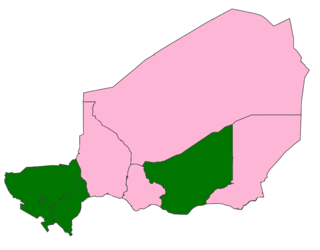The History of Benin since the 16th century, for the geographical area included in 1960 in what was then called the Republic of Dahomey before becoming the People's Republic of Benin.

Abdoulaye Wade is a French then Senegalese politician who was President of Senegal from 2000 to 2012. He is also the Secretary-General of the Senegalese Democratic Party (PDS), having led the party since it was founded in 1974. A long-time opposition leader, he ran for President four times, beginning in 1978, before he was elected in 2000. He won re-election in 2007 with a majority in the first round, but in 2012 he was defeated in a controversial bid for a third term.

The president of Zambia is the head of state and the head of government of Zambia. The office was first held by Kenneth Kaunda following independence in 1964. Since 1991, when Kaunda left the presidency, the office has been held by seven others: Frederick Chiluba, Levy Mwanawasa, Rupiah Banda, Michael Sata, Edgar Lungu and the current president Hakainde Hichilema, who won the 2021 presidential election. In addition, acting president Guy Scott served in an interim capacity after the death of President Michael Sata.

The Pan-African Union for Social Democracy is a political party in the Republic of the Congo headed by Pascal Lissouba, who was President from 1992 to 1997. It has been the country's main opposition party since Lissouba's ouster in 1997. Pascal Tsaty-Mabiala has been Secretary-General of UPADS since 2006.

Elections in Benin take place within the framework of a multi-party democracy and a presidential system. Both the President and the National Assembly are directly elected by voters, with elections organised by the Autonomous National Electoral Commission (CENA).

Burkina Faso elects on the national level a head of state – the president – and a legislature. The president is elected for a five-year term by the people. The National Assembly has 127 members, elected for a five-year term by proportional representation. Burkina Faso has held democratic elections since 1965. The history of elections has been slightly inconsistent, with the government dynamically changing at the hands of various coups, constitutional changes, and boycotts from various political parties. In 2015, the country experienced its first peaceful and fair election ever. Corruption plagued Burkina Faso's presidential elections for 50 years, but following a coup overthrowing Blaise Compaoré, the nation has seen more democratic and less corrupt electoral processes. Terrorism has played a substantial role in Burkina Faso's elections, with candidates running on the promise to keep the nation safe from the rise of Islamic jihadism they experienced in the 2010s. Historically, a few different parties have held power in Burkina. The Organization for Popular Democracy – Labour Movement was former president Compaoré's party affiliation, and thus they held power from 1987 to 2014. His party took power through a coup, and in 2014 also lost their control when the Regiment of Presidential Security overthrew the government.

Elections in the Comoros take place within the framework of a multi-party democracy and a presidential system. The President and the majority of the seats in the Assembly of the Union are directly elected.

Elections in Guinea-Bissau take place within the framework of a multi-party democracy and a semi-presidential system. Both the President and the National People's Assembly are directly elected by voters.

General elections were held in the Central African Republic on March 13, 2005 to elect the President and National Assembly. A second round was held for both elections on May 8, marking the end of the transitional process that began with the seizure of power by François Bozizé in a March 2003 coup, overthrowing President Ange-Félix Patassé. A new constitution was approved in a referendum in December 2004 and took effect the same month.

Mahamadou Issoufou is a Nigerien politician who served as the president of Niger from 7 April 2011 to 2 April 2021. Issoufou was the prime minister of Niger from 1993 to 1994, president of the National Assembly from 1995 to 1996, and he was a candidate in each presidential election from 1993 to 2016. He led the Nigerien Party for Democracy and Socialism (PNDS-Tarayya), a social democratic party, from its foundation in 1990 until his election as president in 2011. During the presidency of Mamadou Tandja (1999–2010), Issoufou was the main opposition leader.

Presidential elections were held in Mauritania on 11 March 2007. As no candidate received a majority of the votes, a second round was held on 25 March between the top two candidates, Sidi Ould Cheikh Abdallahi and Ahmed Ould Daddah. Abdallahi won the second round with about 53% of the vote and took office in April.

Presidential elections were held in Senegal on 27 February 2000, with a second round taking place on 19 March after no candidate won over 50% of votes in the first round. Although incumbent President Abdou Diouf of the Socialist Party won the most votes in the first round, he was defeated by long-term opposition leader Abdoulaye Wade of the Senegalese Democratic Party in the second round, marking the first time that the Socialist Party and its predecessors had lost power since independence. Voter turnout was 62% in the first round and 61% in the second.

General elections were held in Niger in 1999; the first-round of the presidential elections was held on 17 October, with a run-off held alongside National Assembly elections on 24 November. The elections followed a coup d'état on 9 April, in which Ibrahim Baré Maïnassara, who had led an earlier coup in January 1996 and won disputed presidential elections, was assassinated. Coup leader Daouda Mallam Wanké initiated a transitional period that concluded with the victory of Mamadou Tandja, the candidate of the National Movement for the Society of Development (MNSD), over Mahamadou Issoufou, the candidate of the Nigerien Party for Democracy and Socialism (PNDS), in the run-off. The vote for the first National Assembly of the Fifth Republic, which had originally been scheduled for October, but delayed in August, also saw a victory for the MNSD, which won 38 of the 83 seats. It formed a coalition with the Democratic and Social Convention in order to gain a majority in the Assembly.

Presidential elections were held in Guinea-Bissau on 28 June 2009 following the assassination of President João Bernardo Vieira on 2 March 2009. As no candidate won a majority in the first round, a second round was held on 26 July 2009 between the two leading candidates, Malam Bacai Sanhá of the governing African Party for the Independence of Guinea and Cape Verde (PAIGC) and opposition leader Kumba Ialá. Sanhá won with a substantial majority in the second round, according to official results.

General elections were held in the Central African Republic on 30 December 2015 to elect the president and National Assembly. As no presidential candidate received more than 50% of the vote, and following the annulling of the results of the National Assembly elections by the Transitional Constitutional Court, a second round of the presidential elections and a re-run of the parliamentary elections were held on 14 February 2016, with second round run-offs for the parliamentary elections on 31 March.

General elections were held in Niger on 31 January 2011 to elect the President and National Assembly, with a second round of the presidential elections on 12 March. The first round of the presidential elections was originally scheduled to be held on 3 January and the second round on 31 January, but was later postponed. The elections followed a military coup in February 2010 that ousted President Mamadou Tandja.

General elections were held in Niger on 21 February 2016, with a presidential run-off held on 20 March. A total of 15 candidates ran for the presidency, with incumbent President Mahamadou Issoufou running for re-election for a second term. There were two main opposition candidates also vying for the top post, Seyni Oumarou of the National Movement for the Society of Development (MNSD), who lost to Issoufou in 2011, and Hama Amadou of MODEN/FA, who has been campaigning from prison since November 2015. Most of the opposition agreed to align for the second round to back the second-placed candidate against Issoufou.

General elections were held in Nigeria on 23 February 2019 to elect the President, Vice President, House of Representatives and the Senate. The elections had initially been scheduled for 16 February, but the Electoral Commission postponed the vote by a week at 03:00 on the original polling day, citing logistical challenges in getting electoral materials to polling stations on time. In some places, the vote was delayed until 24 February due to electoral violence. Polling in some areas was subsequently delayed until 9 March, when voting was carried out alongside gubernatorial and state assembly elections.

General elections were held in Namibia on 27 November 2019. Ballots were cast using electronic voting. A total of eleven candidates ran for the presidency and fifteen political parties contested the National Assembly elections.

General elections were held in Niger on 27 December 2020 to elect the President and National Assembly. With incumbent president Mahamadou Issoufou stepping down following his two terms constitutional limit, new presidential candidates competed for office. As no presidential candidate received a majority of the vote on the first round, a second round was held on 21 February 2021. The ruling Nigerien Party for Democracy and Socialism (PNDS) candidate Mohamed Bazoum was declared the winner, beating Mahamane Ousmane in the second round with 56% of the vote. In the National Assembly elections the PNDS won 79 of the 166 seats, falling just short of a majority.


















